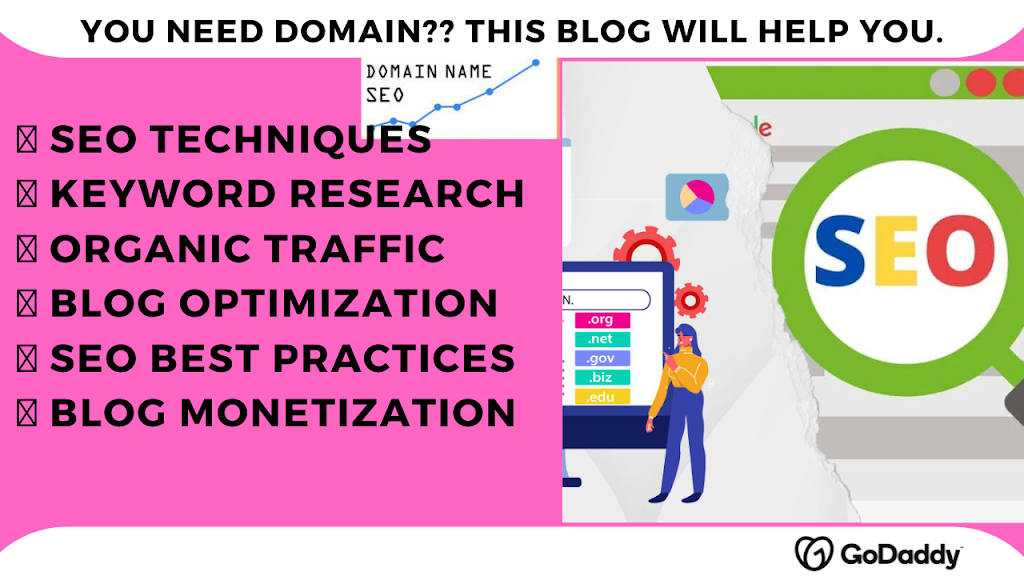How to buy the domain, What is SEO of Domain, buy a domain on GoDaddy, go daddy, by Syed Mohsin Raja.
A domain, in the context of the internet, refers to the
unique and human-readable address used to identify a website. It’s the name
that people type into their web browsers to access a specific website. A domain
consists of two main parts: the actual name (such as “example”) and
the domain extension (such as “.com,” “.org,”
“.net,” etc.). For example, in the domain “example.com,”
“example” is the name, and “.com” is the domain extension.
In terms of ranking on Google and other search engines, all
domains have the potential to rank, but the level of competition and the
strategies you employ can influence your ranking. Here are some factors to
consider:
- Domain
Relevance: Domains that closely match the search intent and content of
their target audience have a better chance of ranking. A domain name that
reflects your website’s topic or industry can help with relevance. - Quality
Content: The content on your website is one of the most critical
factors for ranking. High-quality, valuable, and relevant content that meets
users’ needs and answers their queries can significantly improve your
ranking. - Backlinks:
Backlinks, which are links from other websites pointing to yours, are an
important ranking factor. High-quality, authoritative backlinks from
reputable sources can boost your domain’s authority and improve your
chances of ranking well. - User
Experience: Google considers user experience as a ranking factor. A
well-designed website that is easy to navigate, loads quickly, and is
mobile-friendly can positively impact your ranking. - Technical
SEO: Proper technical optimization, such as having a clean site
structure, optimizing images, using proper header tags, and having a
fast-loading website, contributes to better rankings. - Keyword
Optimization: While the exact match domain (EMD) used to have a strong
influence, Google’s algorithms have evolved to focus more on content
relevance than just the domain name. However, using relevant keywords in
your domain, content, and metadata can still be beneficial. - Domain
Age: Older domains might have some SEO advantage due to having been
around longer, but it’s not the only factor. Newer domains can still rank
well if they offer valuable content and follow best SEO practices. - Competition:
The level of competition for specific keywords and topics can vary. Some
industries or niches might have more competitive landscapes, making it
harder to rank quickly. - Local
SEO: If your website has a local focus, optimizing for local search
and including location-specific keywords in your content and domain can
help you rank better for local queries. - Consistency
and Authority: Consistently publishing high-quality content and
establishing your website as an authoritative source in your niche can
lead to improved rankings over time.
In summary, while domain name does play a role,
it’s just one of many factors that influence how well your website ranks on
Google. A well-rounded SEO strategy that includes quality content, relevant keywords, strong
backlinks, and a positive user experience is crucial for achieving and
maintaining good search engine rankings.
How to buy good ranking domain
It seems like you’re looking for guidance on purchasing a
good domain name for your website. A domain name is an essential part of your
online identity, so choosing the right one is important. Here are some steps
and tips for buying a good domain name:
- Brainstorm
Keywords and Concepts: Start by brainstorming keywords and concepts
related to your website’s niche, industry, or content. Think about what
your website will be about and what words or phrases are relevant. - Keep
it Short and Memorable: A good domain name is usually short and easy
to remember. Avoid long, complicated names that are hard to spell or type. - Avoid
Hyphens and Numbers: Hyphens and numbers can be confusing when spoken
and make a domain name harder to remember. Stick to letters if possible. - Choose
a Relevant Extension: The most common domain extension is
“.com,” and it’s generally recommended to go for it if
available. However, depending on the nature of your website, other
extensions like “.net,” “.org,” or more specific
extensions like “.tech,” “.blog,” etc., might be
appropriate. - Avoid
Copyright and Trademark Issues: Ensure that the domain name you choose
doesn’t infringe on any existing trademarks or copyrights. This can lead
to legal troubles in the future. - Check
for Availability: Once you have a few domain name options in mind, use
a domain name registrar’s search tool to check if they are available. Many
registrars offer search functionality that suggests alternative names if
your preferred choice is already taken. - Consider
Branding: If your website is for a business or personal brand,
consider how the domain name aligns with your brand identity. It should
reflect your brand’s values and message. - Research
History: Check the history of the domain name you’re interested in.
Some domains might have been previously used and could have a negative
history associated with them. You can use tools to check if a domain was
previously used for spammy or black-hat SEO practices. - Domain
Age: Older domains might have some SEO advantage, as search engines
tend to give them a bit more credibility. However, this is just one factor
among many. - Use
Domain Name Generators: If you’re having trouble coming up with a
unique domain name, you can use domain name generators. These tools can
provide you with suggestions based on keywords you input. - Price
Consideration: Domain prices can vary greatly depending on factors
like the popularity of the keywords, domain length, and the registrar
itself. Be prepared for a range of prices and set a budget. - Privacy
and Security: When purchasing a domain, consider getting domain privacy
protection. This hides your personal contact information from being
publicly accessible in the domain’s WHOIS records. - Register
with a Reputable Registrar: Choose a reputable domain registrar for
your purchase. Popular registrars include GoDaddy, Namecheap, Google
Domains, and more.
Remember, your domain name is a significant part of your
online presence, so take your time and choose wisely. It will be how visitors
find and remember your website.
Article by








